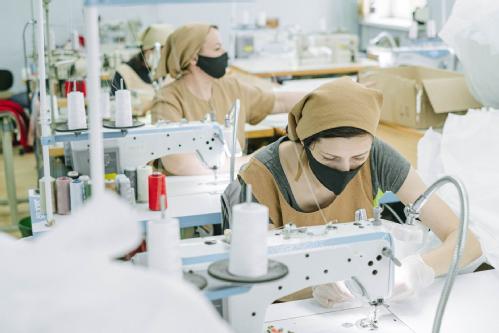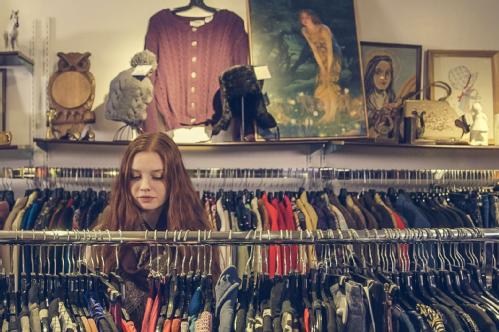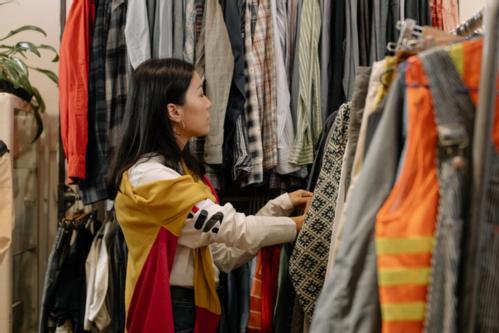Fast Fashion
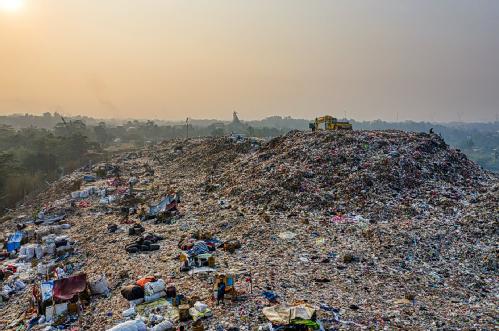
What is it?
Fast Fashion is the trend of clothes being mass produced quickly and cheaply in line with everchanging fashion trends. Fashion is a fast paced game, and, made of fabrics which often fade and become worn out, these clothes are designed to be as temporary as the looks they are inspired by. Globally we are producing 400% more clothes than 20 years ago. And on average we are only wearing clothes seven times before getting rid of them. The trend of mass producing and mass dumping clothes has placed the fashion industry as the second largest polluter in the World - just after the oil industry.

The impact
The fashion industry is responsible for around 10% of carbon emissions worldwide. Clothes are often made of cheap synthetic materials, which are heavily reliant on fossil fuels for production. Materials are flown, instead of shipped to factories, to meet tight deadlines. For companies to keep costs down, clothes can end up travelling thousands of miles, before landing in our wardrobes.
Cotton requires a huge amount of water to produce. The water used for producing cotton in India could cover 85% of India's water consumption. Instead 50% of people living in rural India do not have access to clean drinking water. The clothing industry contributes a huge amount of water pollution too. Wastewater from textile factories, full of toxic chemicals from dyes, is often dumped directly into rivers from factories, damaging aquatic life and polluting water sources for local people and animals.
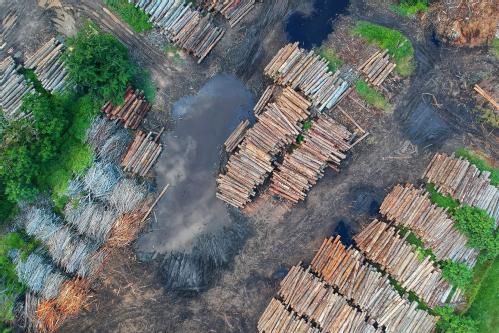
The impact continued
Around 70 million trees are chopped down every year, to be turned into wood based fabrics such as viscose, where wood pulp is treated with chemicals to become fabric. Dissolving pulp wastes up to 70% of the tree used, and causes harmful chemicals to be released into our atmosphere, and into our waterways, during the process.
Two tonnes of clothes are bought every minute across the UK. Globally, we now throw away so much that, on average, every second a truck full of clothes is dumped into landfill. The cheapness and accessibility of clothes have enabled clothes to be seen as disposable items. This causes more waste than we, globally, are able to manage, and increases the clothing demand to replace these items.
What the industry is doing to reduce its impact
ReGain App: A scheme that encourages people to donate clothes instead of binning them. Clothes that are donated are either resold in charity shops or, if unusable, are sold for textile recycling. In return for the donation, you can get a discount code for one of the many brands ReGain is partnered with. The app is aimed at people who shop at these brands, to donate clothes rather than send them to landfill.
Clean Clothes Campaign: An alliance of organizations around the world, focusing on the improvement of working conditions in the garment and sportswear industries. The campaign puts pressure on governments and companies to ensure rights of manufacturing workers are respected and works to strengthen global legislation for worker’s rights. It has a number of ongoing campaigns that you can get involved with, such as their Fashion Fact Checker, and the Jaba Garmindo Campaign.
International Safety Accord: A 26-month legally binding agreement for clothing brands, focused upon improving health and safety for workers in garment factories, and strengthening legislation for the rights of factory workers. See the full list of brands that have and haven’t signed up.
Textiles 2030: The Waste and Resources Action Programme is a UK charity fighting waste and promoting sustainability, working with governments and businesses. Textiles 2030 is an initiative which is focused upon reducing waste and increasing transparency of the Fashion Industry. The targets include reducing the greenhouse gas footprint of new clothing products by 50% and reducing the water footprint of new products sold by 30%.
What you can do
Buy second hand - Local charity shops are a great place to start. With much lower prices than high street shops, shopping in charity shops saves you money, reduces waste, and raises money for charity all at once. Depop, eBay and vinted are great online alternatives - a place to buy, not just clothes, but untouched make-up, bags and accessories.
Give clothes away - LWS night shelter in Leamington Spa are often looking for clothes donations. Charity shops take clothes that are in good condition - but double check before donating, as shops can struggle with storage space. Care4Calais has drop off points for clothes in Warwick and Coventry - clothes are donated to refugee camps. There's also a number of clothes banks for Salvation Army locally - where clothes are either sold in charity shops or donated overseas.
Sell your unwanted clothes - for example on Depop, eBay, vinted and Facebook marketplace.
Choose clothing made from sustainable fabrics - A number of independent businesses priortise social and environmental sustainability, using recycled and sustainable materials, such as sustainably sourced bamboo and cotton, and do not rely on cheap, unethical labour. Examples include Lucy and Yak, House of Sunny, Nobody’s Child, Omnes, Thinking Mu and Girlfriend Collective.
Useful links and apps
Good On You - Check which brands you’re wearing are truly ethical
Re-Fashion - Re-Fashion believes the future of fashion is circular and wants to eliminate clothes waste for good.
Depop - Depop is the fashion marketplace with a global community buying, selling and connecting to make fashion more inclusive, diverse and less wasteful.
The True Cost - An interesting documentary focused upon the impacts of fast fashion. Directed by Andrew Morgan, it demonstrates the social and environmental impact of the fashion industry
River Blue -Conservationist Mark Angelo chronicles his three year river journey, where he documents the polluting impact the fashion industry has on our waterways, and the impact this has on us and our world.
The Machinists - A documentary which closely follows the three garment workers and a union boss who make clothes for popular high street brands, like Primark and Zara, in the clothing factories of Dhaka, Bangladesh. It documents the extreme daily exploitation these workers face.

